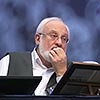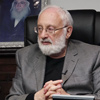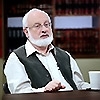Audio Version Of The Blog – 3/31/21
Listen to an Audio Version of the Blog
Download:MP3 Audio

Listen to an Audio Version of the Blog
Download:MP3 Audio

We will not be able to organize a good society by debating “who is right and who is wrong.” The one who’s right is the one who wishes to unite with those who are against him. We thereby give the Creator a place for revelation and management.
We have just one head of government—”above.”
In the network of forces between us, in opposition to one another and, at the same time, by rising above the rejection, we reveal the upper force. Only when we are united above all the differences does the upper force become revealed and rules over us.
The Creator created us opposite—we all live in #hatred and rejection from each other. But we should not take the breakage into account. On the contrary, “Love will cover all sins.” No matter how many sins we reveal, we must reveal love above them.
From Twitter, 3/31/21
Related Material:
My Thoughts On Twitter 3/25/21
My Thoughts On Twitter 3/23/21
My Thoughts On Twitter 3/20/21
My new article on Linkedin “What Really Makes Life Precious”
Recently, many analyses have surfaced showing the excess mortality that Covid-19 has wrought. Even with the existence of vaccines, the virus is still spreading and in many countries, claims hundreds, and even thousands of lives each day. This grim reality has prompted some students to ask me about the meaning of life and death.
If we want to give our lives meaning, we should spend it connecting to other people—not in order to use them, but in order to care about them. This is what makes life precious.
Indeed, we treat life as something very important, and for a good reason, but on condition that we act on this reason. If we go through our lives just passing the time, then all we get out of it is the few ounces of pain we have collected. However, if we use it to make the most of the opportunity we have received to approach, or even achieve the spiritual realm of life, namely to connect with other people to the point where we feel them in our hearts, then life is precious.
Inherently, we feel that we do not owe anything to anyone and should only please ourselves. However, we do not realize that this is just our starting point in life. If we end life at the same point where we started, then we have wasted our chance to make progress. From thinking of nothing but ourselves, we should spend our lives trying to extend ourselves and connect to others, to develop care for others. By doing so, we become similar to the connectivity that permeates all of nature and our consciousness expands proportionally.
A newborn baby doesn’t know anything of its environment except for the existence of its own mother, and even that awareness only pertains to the sides of her that relate to the baby. As the baby grows, it begins to realize that there are other things and people around, and begins to communicate with them.
The same process should happen internally. We should evolve from knowing and feeling only ourselves to knowing and feeling our whole environment—people, animals, and objects. This can happen only if we care about them. If we only seek to use them to please ourselves, we will know about them as much as the newly born knows about its mother. What a shame it is to die without having learned more about the reality we live in.
If we want to give our lives meaning, we should spend it connecting to other people—not in order to use them, but in order to care about them. This is what makes life precious.
My new article on Linkedin “ To the Left, to the Right, but Always Forward ”
We’ve had Nazism and we’ve had Communism; we’ve had Socialism and we’ve had Capitalism. We’ve had Autocracy, we’ve had Democracy, we’ve had monarchies, and we’ve had republics. Life consists of opposites: left, right, sun, moon, hot, cold, winter, summer, hate, love, joy, and sadness. Without one, there would not be the other; without either, there would not be existence. But if we exist, it means we have both.
Life is not static; it is ever evolving, ever moving forward. Layer upon layer, life develops. When a new layer appears, its two opposites manifest, fight each other for a while, and eventually recognize that neither can exist without the other, so they form a bond. Subsequently, that bond becomes the basis for the onset of the next layer in line.
Life is not static; it is ever evolving, ever moving forward. Layer upon layer, life develops. When a new layer appears, its two opposites manifest, fight each other for a while, and eventually recognize that neither can exist without the other, so they form a bond. Subsequently, that bond becomes the basis for the onset of the next layer in line.
When the physical layers of evolution are all present, a subtler set of layers of opposites begins to emerge. This is the realm of humans. On the human level, the layers are not physical but intellectual, emotional, ideological, and spiritual. However, the same rule always applies; there is none other. Ideologies, schools, and practices always come in pairs of opposites. At times they manifest concurrently and at other times alternately, but if there is one, there is, was, or will be the other.
Now, war and peace are a unique pair of opposites. They have no specific spot in the evolution of reality. Instead, they manifest at each and every layer. War represents the initial stages of the layer, when the sides disagree with each other’s existence, and peace represents the stage where they accept, and finally welcome and support one another. When both sides understand that the other is indispensable, they change their attitude to their former adversary, which then becomes tolerated, accepted, and welcome, until the two sides form a bond. The bond, in turn, becomes the basis for the emergence of the next layer where the process reoccurs.
The Hebrew word for “peace,” by the way, is shalom. Shalom does not mean absence of war, but rather stems from the words “hashlama” [acceptance or complementation] and “shlemut” [wholeness]. Therefore, the initial stage of every new layer in reality is war, namely a struggle for dominance, and it is completed with the establishment of peace, which marks the acceptance of the interdependence between the parties and the subsequent bond they establish.
Every sports team and army unit knows the importance of the bond among its members. The bond they establish is often the difference between victory and defeat, between life and death. To a society, establishing peace, namely mutually accepting the contradictions and opposites within, and forming a bond between them, is just as significant, if not more. Working in this way synchronizes such a society with the rest of nature, with the “engine” of reality.
Currently, people fight each other to death until they’re exhausted and reluctantly accept the existence of the other party. Is it any wonder that life seems like a sequence of torments? Think what life would be like if we were aware of the mechanism of emergence and eventual bonding of opposites. Our lives would not only advance and develop infinitely faster and completely painlessly, but every moment would be a celebration. We would not experience oppositeness as dissention, but as a springboard, like a trampoline, where the lower you sink in moments of struggle, the higher you jump at the times of peace. Is there any child who doesn’t like bouncing on a trampoline? And once we are at the peak of the jump, we will anticipate and welcome the next descent, knowing it will lead to yet another jump, even higher than before.
It turns out that the difference between a morose and dejected society, and one that is jovial and lively, is only the awareness and understanding of the progress of development. The more people understand how reality works, the more they will view life from a positive and constructive perspective, and the happier they will be. If you want to see your loved ones happy, if you want to live in a cohesive society where people seek to bond, forward these words; let them know about the principle of making peace, the principle of complementing opposites that leads all of reality to the left, to the right, but always forward.
[280367]
My new article on Linkedin “Politics of the Obstinate”
After a fourth election in less than two years, Israel has become the world’s laughing stock. But for the State of Israel, it isn’t funny. The country is paralyzed in many respects, from offices that require ministers, to large projects that are stuck due to indecision, through Covid vaccines that must be bought. Indeed, this is the nature of the Jews: an obstinate people. Nevertheless, if we use our obstinacy correctly, we will turn it into resolve to unite above our differences, which in turn will lift us to unimaginable achievements.
Today, when Israel is engulfed in perpetual political frays that begin to resemble those of our forefathers, we should realize that it is a calling to employ the same method that they used—to realize that differences are not reasons to break up, but to strengthen our unity. We will have no relief from internal enmity until we realize that we cannot defeat one another since the war is not meant to be won, but to yield cohesion.
There is a reason why the Jewish people are so obstinate. They are descendants of people who would not relinquish their views and tried everything they could to crown their opinion over the people of Israel. Having exhausted themselves trying, they finally realized that the flaw was not in their own view or in the opposite view, but in their own nature, which sought dominion and separation instead of collaboration and union. They realized that life can be complete only when there are two sides that complement one another, so the other view is actually a complementary perception and not an opposite.
This realization of the ancient Hebrews created a unique nation whose bond was not biological but rather ideological and spiritual. Even more important, their union marked a way for all of humanity to unite despite biological, ethnic, cultural, religious, and racial differences. Once the Hebrews chose union over separation, every dispute became a reason for strengthening their bond rather than for shredding the nation. Moreover, since the original Jews came from the Fertile Crescent, the cradle of most of today’s nations, the bond they had formed became a proof that peace among all nations is possible, and that there is even a method for achieving it.
Today, when Israel is engulfed in perpetual political frays that begin to resemble those of our forefathers, we should realize that it is a calling to employ the same method that they used—to realize that differences are not reasons to break up, but to strengthen our unity. We will have no relief from internal enmity until we realize that we cannot defeat one another since the war is not meant to be won, but to yield cohesion.
When we finally realize this and achieve union, the world, which now derides us, will look in awe at the miracle of the Jewish state. It will want to emulate our method. This will mark the final victory of peace—which comes from the Hebrew word “complementation”—over war. The politics of the obstinate, therefore, should not be about being more obstinate than the other, but about rising together above intransigence and forming a genuine bond.
 People follow the religious commandments with great enthusiasm because they feel great support for their desire to receive pleasure; they are willing to make efforts to receive rewards in this world and most importantly in the future world, forever. Therefore, a person is ready to work all the years of his life in order to receive eternal life.
People follow the religious commandments with great enthusiasm because they feel great support for their desire to receive pleasure; they are willing to make efforts to receive rewards in this world and most importantly in the future world, forever. Therefore, a person is ready to work all the years of his life in order to receive eternal life.
But how can one avoid the shame of receiving such a thing so as not to work for the Creator out of self-interest? That is why the whole reality was created, so we could work in it and instead of being rewarded for our work, the work itself will give us new organs of perception that allow us to enter the world, the whole of which is a reward.
Kabbalah can never become a religion because a Kabbalist goes through changes all the time. Religion is based on rigid attitudes that are forbidden to be changed, on dogmas that cannot be deviated from, which clearly define everything that needs to be done.
And Kabbalah, at its core, as a method of advancing to the Creator, presupposes constant changes in a person. Each time, the Creator is new, and I am new, with a new relationship, a new group. Therefore, Kabbalah is not considered a religion.
Every second, every time, every person and the whole ten together check themselves and constantly change. After all, everything is subject to change since it is being realized in our desire to receive pleasure, which is constantly changing.
People who like to obey clear orders prefer a religious framework and derive content from following them.
A Kabbalist is always in doubt, in clarification, in uncertainty, and must cling to the Creator through the group in order to attract some light that illuminates his path. And this is the right way for spiritual development, because in this way we build ourselves in the likeness of the Creator and become people, “sons of Adam,” having made our way through all this confusion and turmoil.
According to the definition of Kabbalah, Bnei Baruch is a movement aimed at revealing the Creator to the creatures in this world.
[280212]
From the Daily Kabbalah Lesson 3/29/21, “Pesach (Passover)”
Related Material:
The First Degree
Independent Of Good And Evil
Concealment Teaches Us How To Correct Ourselves
 Question: All the four exiles of Israel are felt to be rather severe states. How can one understand anything and advance in such terrible descents? What should one do?
Question: All the four exiles of Israel are felt to be rather severe states. How can one understand anything and advance in such terrible descents? What should one do?
Answer: Be above all problems and understand that they all are created so that you can feel them and be able to rise above them. Nothing else. After all, it is possible to pull us out of our egoistic matter only when we feel how much we suffer in it. Otherwise, you will not be able to rise above it.
Question: Where is that rope that one can grab in order to rise above this?
Answer: This rope appears when a person is in complete despairs of his abilities. It is not so easy to achieve this state. But The Book of Zohar accelerates this process.
Baal HaSulam writes that the happiest moment in a person’s life is when he begins to feel to what extent he is unable to understand and realize anything. He is completely lost, like a small child who is trembling, and crying having lost his way in a deep forest.
When one reaches such a state of absolute despair from his inability to change something in himself or in the world around him, he feels hopelessness, insignificance, meaninglessness, and then the light of redemption comes to him, which gives him a feeling of eternity, perfection, and the necessity to integrate himself into the creation.
Only in a state of extreme exhaustion of his own strength, when he sees that he cannot help himself with anything, does he begin to need the upper force that will manifest in him and lead him upward.
We believe that by our own strengths, properties, and mind we are capable of everything: “How can we sacrifice our own I”? But in fact, when a person gives up all this, he suddenly feels totally free. Therefore, our most important task is to break away from our egoism.
[279946]
From KabTV’s “The Power of The Book of Zohar” #8
Related Material:
Why Do I Feel This Way?
Exile From Love
Brothers In Exile
 Question: There are students who don’t feel the need to ask questions for years. Does this prevent their advancement?
Question: There are students who don’t feel the need to ask questions for years. Does this prevent their advancement?
Answer: It depends on the student’s nature. There are 400 students sitting in front of me every day and about 20 of them ask me questions regularly, I already know them by heart. They cannot behave differently because they need to study through a dialogue with the teacher. They must ask a question and hear the answer that is specifically for them. Otherwise, they don’t hear what is said.
It is a big question whether they hear what others are saying. So, on one hand, I complain to them, and on the other hand, I understand that they need to hear the specific answer to their question and integrating in other’s questions is a problem for them.
Fortunately, there are not many, I already know them, and there is nothing I can do about it. Without them, there would be no questions, and if there are no questions something is missing. So let them ask. It depends on a person’s character, on the structure of one’s personality. So don’t worry if you study quietly and don’t ask questions. It is not a problem, as long as you are present.
[245724]
From KabTV’s “Fundamentals of Kabbalah” 4/4/19
Related Material:
A Question Is A Desire For Fulfillment
What Is A “Question” in Spirituality?
Platform For Discoveries
 Comment: Today, people do not want any obligations to each other and therefore do not marry.
Comment: Today, people do not want any obligations to each other and therefore do not marry.
My Response: A person is an egoist. If he understood that marriage would really fill him and was created so that he could give and receive in marriage, he would see that there is nothing better.
But for this, a form of communication needs to be created so that a man is fulfilled from his wife, children, and family so that he has exactly such needs, qualities, desires that are not artificially changed s o that he is forced to run away in the evenings somewhere to clubs, bars.
It’s the same with a woman. She must be determined to create for her family, her husband, and her children the conditions from which she herself would enjoy. Therefore, appropriate education is needed here. It doesn’t matter that we’ve become more egoistic. Bigger egoism, in fact, should take us to the next level.
We must educate boys and girls properly, teach them how to interact with each other, and not give them only lessons about sex in schools. It turns out that we are just teaching animals the correct sexual relationships, but we do not teach people how to be properly connected with each other, to understand and complement each other.
If we don’t give them that education, the next generation will be miserable. They will come to some mechanical interaction, to something incomprehensible.
Kabbalah says that everything in nature is built on replenishment, on harmony. This replenishment depends on understanding each other’s nature.
I remember when I was in the first year of the institute, we had a professor Svyadoshch Avraam Moiseevich. He took us to different hospitals for surgeries to show us the extreme conditions that people are in immediately after an accident, during a difficult birth, or after a heart transplant.
And we, eighteen or nineteen-year-old boys, were very shaken up by it. When we first came out of the maternity hospital, it was a shock: How difficult it is to give birth, how much blood, how much pain. We almost cried, looking at the women in labor. Our attitude to many things changed. We began to treat even the girls in our group differently.
Based on what I have experienced, I would take all school children to hospitals, maternity hospitals, and morgues to explain and show children what life means, when you go through all the states from birth through various problems, injuries, death, up to the cemetery, all this is necessary. And I would do this with a very serious preliminary preparation, so that the children would not have psychological trauma. This is how an understanding and adult attitude to life is built.
[280042]
From KabTV’s “Close-Up. Common Law Marriage” 8/11/09
Related Material:
Don’t Patch Up Old Relationships, Build Them Anew
The Extraordinary Lightness Of Being
A Look At The Family From The Height Of Global Nature
 Baal Sulam, “The Peace”: In general examination, we find that there are only two Mitzvot to follow in society. These can be called 1) “reception” and 2) “bestowal.” This means that each member must, by nature, receive his needs from society and must benefit society through his work for its well-being. And if one breaks one of these two Mitzvot, he will be mercilessly punished.
Baal Sulam, “The Peace”: In general examination, we find that there are only two Mitzvot to follow in society. These can be called 1) “reception” and 2) “bestowal.” This means that each member must, by nature, receive his needs from society and must benefit society through his work for its well-being. And if one breaks one of these two Mitzvot, he will be mercilessly punished.
Question: If Baal HaSulam believed that there were only two commandments, then where should we place the Ten Commandments? Are these two are divided in 10, 613?
Answer: We lay this all out depending on our states, relationships, etc. But in reality, what else is there in nature beside reception and bestowal? Nothing!
Question: Is this like the fact that there are 365 days, so many hours, and so many seconds in a year, that is, the two main commandments are divided into auxiliary ones?
Answer: Yes. In nature, there is nothing but plus and minus. But when you start introducing them into relationships between people, you lay out people, their relationships, and each person in relation to yourself and others, and then you get a huge number of conditions—to receive and to bestow. And you must somehow bring this together into one system. This, in principle, is described in the Torah.
Comment: Rabbi Akiva went even further claiming that there is one commandment: “Love your neighbor as yourself.”
My Response: It prevails over these two so that both reception and bestowal are only for the sake of others.
[278840]
From KabTV’s “Spiritual States” 12/26/19
Related Material:
The Seventh Commandment Of Noah
You Are Not The Master Of The World
“You Shall Not Bear False Witness Against Your Neighbor”